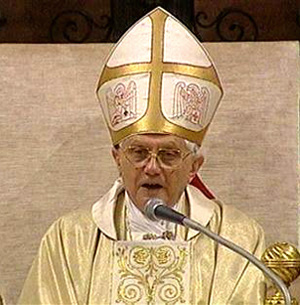Today Benedict XVI visited a Lutheran church in Rome with the purpose of promoting unity by emphasizing the ways in which Catholics and other Christians bear common witness to Christ.
In the German-language service, in which both the Pope and a Lutheran pastor gave homilies, the Pontiff affirmed, “We hear many laments about the fact that there are no new developments in ecumenism, but we must say, and we can say it with much gratitude, that there have already been elements of unity.”
In his address, which the Holy Father delivered without a written script, he invited his listeners to be thankful for the fact that “we are here together on this Laetare Sunday, that we sing together, that we listen to the Word of God together, that we listen to each other, all looking to the one Christ and, thus, rendering testimony to the one Christ.”
Benedict XVI was welcomed with prolonged applause in the Christuskirche on the Via Sicilia in Rome. The choir, composed of Lutherans and German Catholic seminarians, intoned Mozart’s “Jubilate Deo.”
Doris Esch, the president of the Lutheran community of Rome, which has some 350 members, recalled in her welcome speech, given in Italian and German, that in 1983 Pope John Paul II visited the church on the occasion of the 5th centenary of Luther’s birth.
Esch pointed out that today’s ecumenical meeting recalled the 10th anniversary, celebrated last year, of the signing of the joint declaration on justification. She concluded her remarks saying: “May you feel at home here, Your Holiness.”
Benedict XVI was also already familiar with the church. In 1998, when he was prefect of the Congregation for the Doctrine of the Faith as Cardinal Joseph Ratzinger, he met with the Lutheran community during its annual festival.
The young pastor of the community, Jens-Martin Kruse, began his homily acknowledging that “for us it is truly a day of joy.” Pastor Kruse’s homily, appropriately themed for “Laetare Sunday,” was a commentary on the meaning of Christian joy.
Citing St. Paul, he invited his listeners to advance along the way of Christ together, everyone “for each other” and “in tribulation consoling each other with the consolation by which we are consoled by God.”
ROME, MARCH 14, 2010 (Zenit.org)





